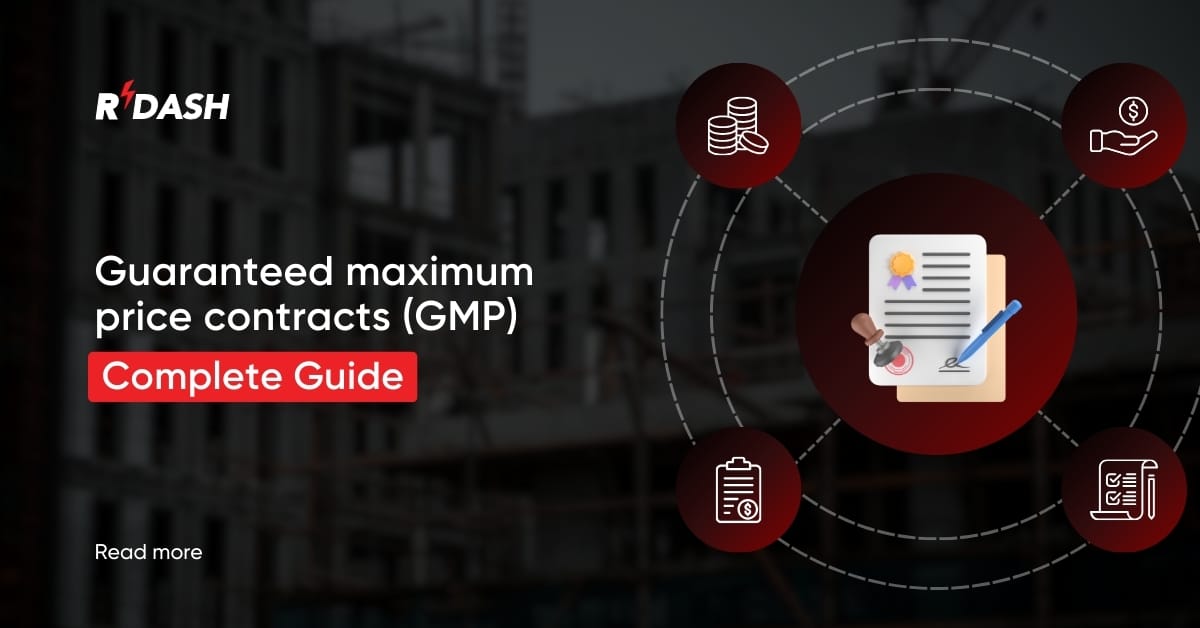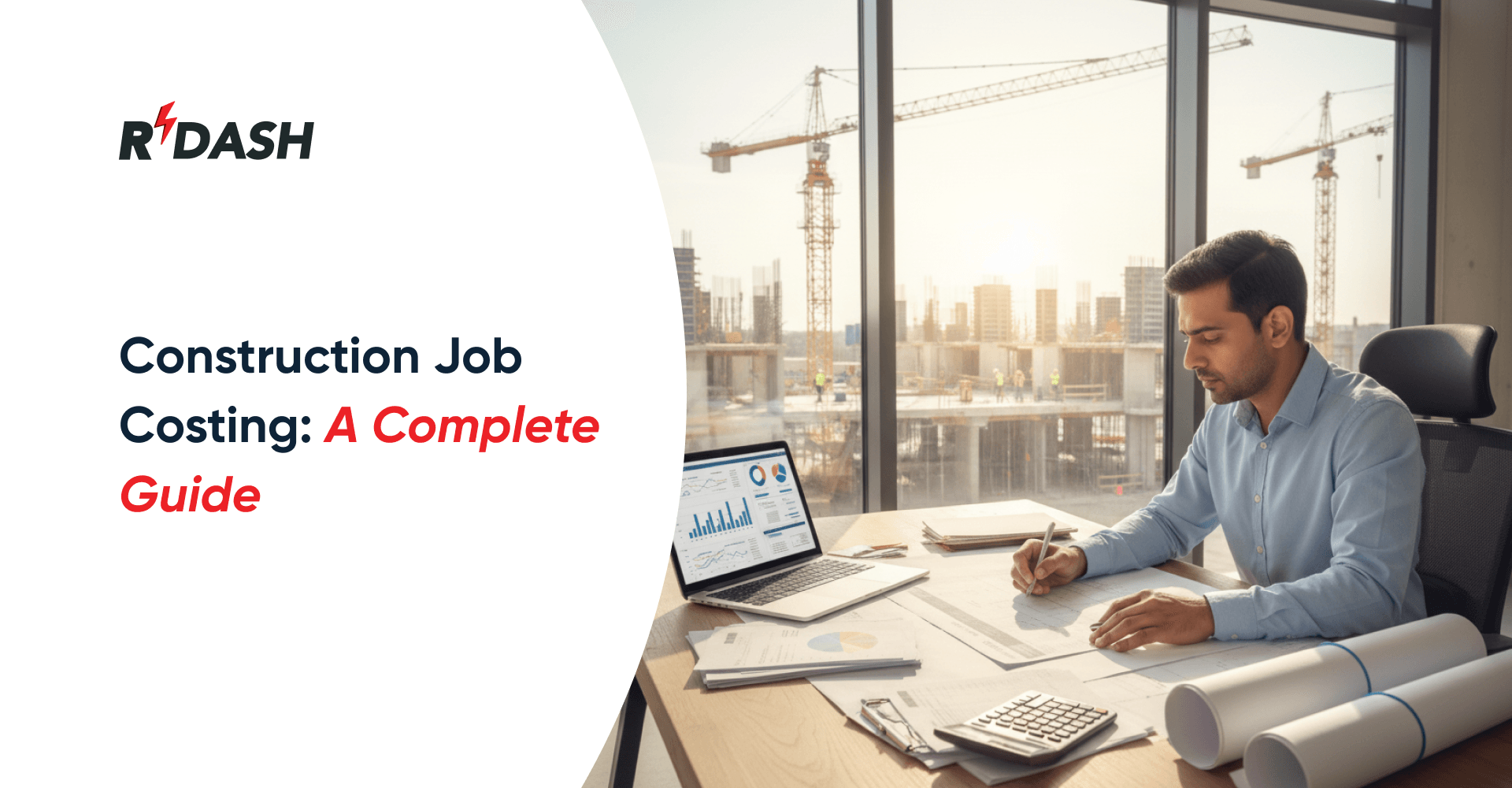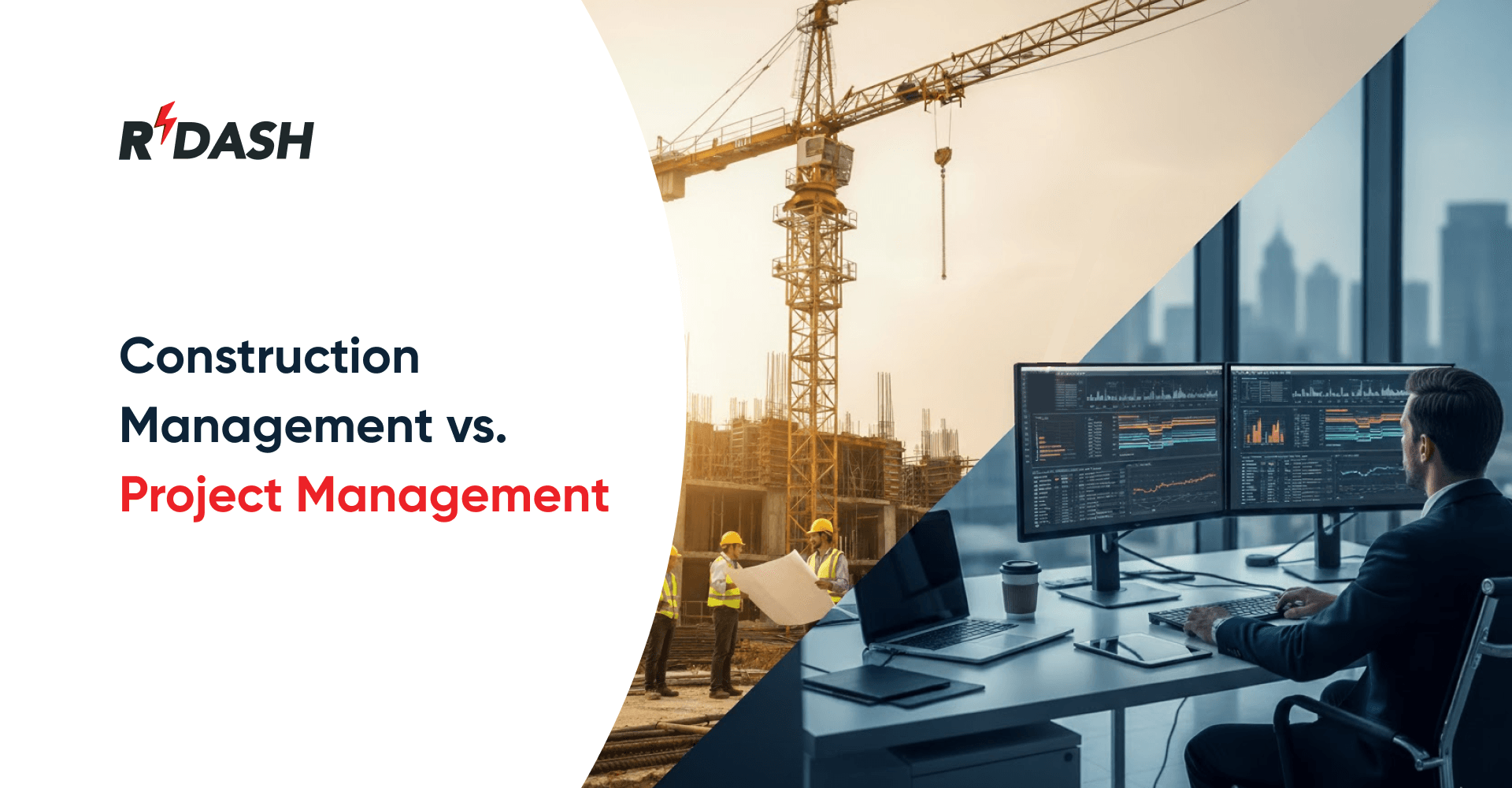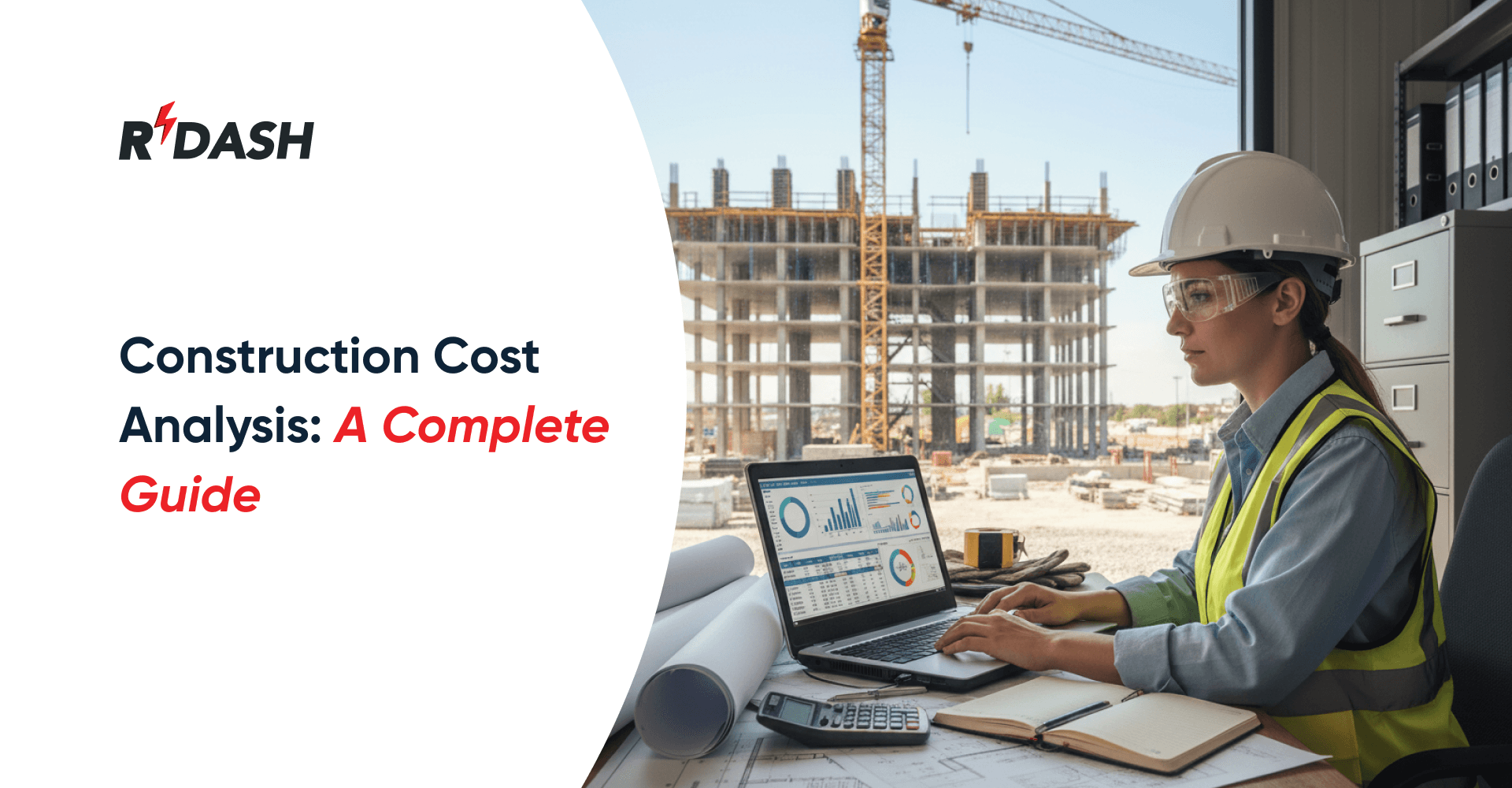In the construction industry, a Guaranteed Maximum Price (GMP) contract is a popular agreement type where the contractor agrees to deliver the project within a set maximum price limit. Fundamentally, the GMP sets a cap on the amount the owner is willing to pay to complete the construction project, irrespective of the actual expenses incurred. If the total project costs exceed this agreed-upon maximum, the contractor is responsible for covering the excess. This type of contract incentivizes efficiency and cost control by the contractor, as any savings against the maximum price can potentially increase their profit margin, depending on the specifics of the contract.
Benefits of Guaranteed Maximum Price (GMP) Contracts
GMP contracts offer several benefits that make them attractive in the construction sector:
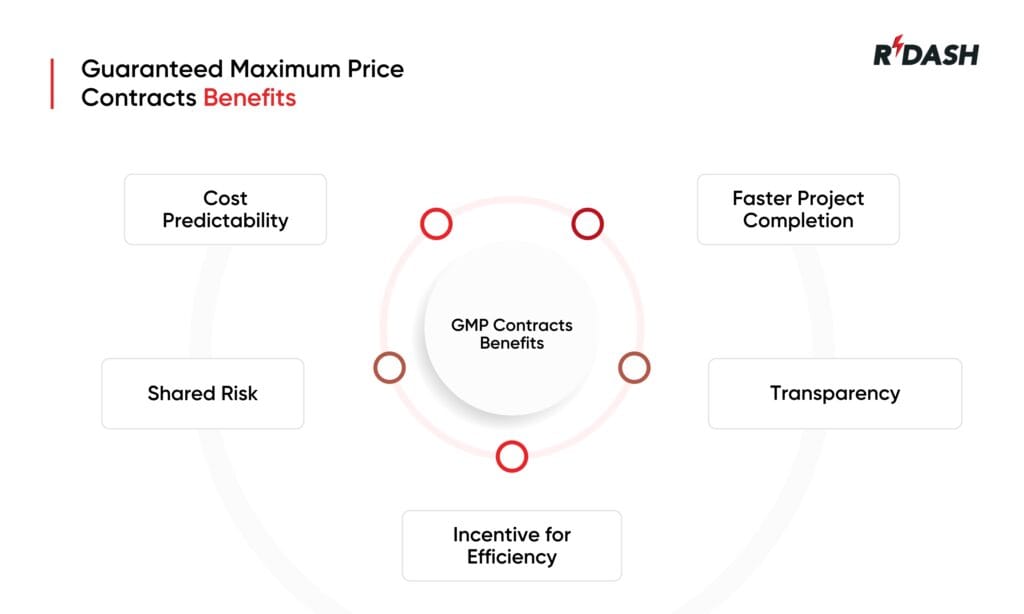
- Cost Predictability: For project owners, the most significant advantage is financial predictability. Knowing the maximum financial commitment upfront aids in budget planning and finance management, reducing the risk of unexpected overspending.
- Shared Risk: GMP contracts create a shared risk environment where both the owner and the contractor have stakes in efficient project completion. While the contractor absorbs any cost overruns, the owner is shielded from unexpected financial burdens.
- Incentive for Efficiency: Contractors are motivated to control costs and work efficiently to stay within the guaranteed maximum price. Any cost savings realized below the GMP can benefit the contractor, depending on the contract terms, promoting smarter management and innovation.
- Transparency: These contracts often require open book accounting, meaning the contractor must provide access to their accounts and records related to project costs. This transparency builds trust and ensures that the owner is aware of where and how their money is being spent.
- Faster Project Completion: Contractors motivated to control costs may also seek to optimize project timelines to reduce labor and management costs, potentially leading to faster project completion.
When are guaranteed maximum price (GMP) contracts used?
GMP contracts are particularly suited to projects where the scope is well-defined, allowing the contractor to accurately estimate costs. They are commonly used in scenarios such as:
- Complex Projects: In projects with many unknown factors or potential for significant complexity, a GMP contract provides a financial safety net for the project owner.
- Projects with Fixed Budgets: For projects where the owner cannot exceed a certain budget due to financial constraints or funding limits, a GMP contract ensures that the project remains financially viable.
- Public Projects: Government or public projects often use GMP contracts to control public spending and ensure that taxpayer funds are managed prudently.
- Private Sector Projects Seeking Cost Security: In the private sector, investors or owners who prioritize budget certainty to ensure financial returns often prefer GMP contracts to mitigate financial risks.
Key Provisions in a guaranteed maximum price (GMP)
The negotiation of clauses in a GMP contract is critical to protect the interests of both parties and ensure the smooth execution of the project:
- Savings Share Clause: This clause determines how any cost savings achieved under the GMP will be divided between the contractor and the owner, incentivizing cost-effective management by the contractor.
- Escalation Clause: To address potential changes in material or labor costs, an escalation clause can be included, which allows for adjustments to the GMP based on specific indices or market conditions.
- Contingency Allowances: These are funds set aside within the GMP for unexpected costs or issues that arise during the project, providing a buffer that can help in staying within the GMP.
- Performance Penalties and Bonuses: Clauses that reward the contractor for completing the project ahead of schedule or penalize for delays, encouraging adherence to the timeline.
Challenges of using guaranteed maximum price (GMP) contracts
While Guaranteed Maximum Price (GMP) contracts offer substantial benefits, they also come with their own set of challenges that project managers and contractors need to navigate:
- Accurate Cost Estimation: One of the biggest challenges with GMP contracts is the need for accurate cost estimations at the outset. Inaccurate cost estimates can create major problems later on, potentially leading to financial losses for contractors if the project expenses surpass the predetermined maximum price.
- Scope Creep: Changes or expansions in project scope that were not accounted for in the initial contract can lead to disputes and complications. Managing these changes without extending the GMP can be a delicate balance.
- Reduced Flexibility: Given the fixed nature of the price ceiling, GMP contracts can sometimes reduce flexibility in managing the project. Contractors might be hesitant to make beneficial changes or improvements if those would mean exceeding the GMP.
- Dependency on Subcontractors: Contractors often rely on various subcontractors to complete a project. Discrepancies in subcontractor estimates or performance can adversely affect the overall project cost, impacting the main contractor’s ability to stay within the GMP.
- Administrative Burden: The requirement for transparency and detailed documentation in guaranteed maximum price contracts can lead to an increased administrative burden. Maintaining meticulous records of all costs can be time-consuming and require additional resources.
What’s included in a guaranteed maximum price (GMP) Contract?
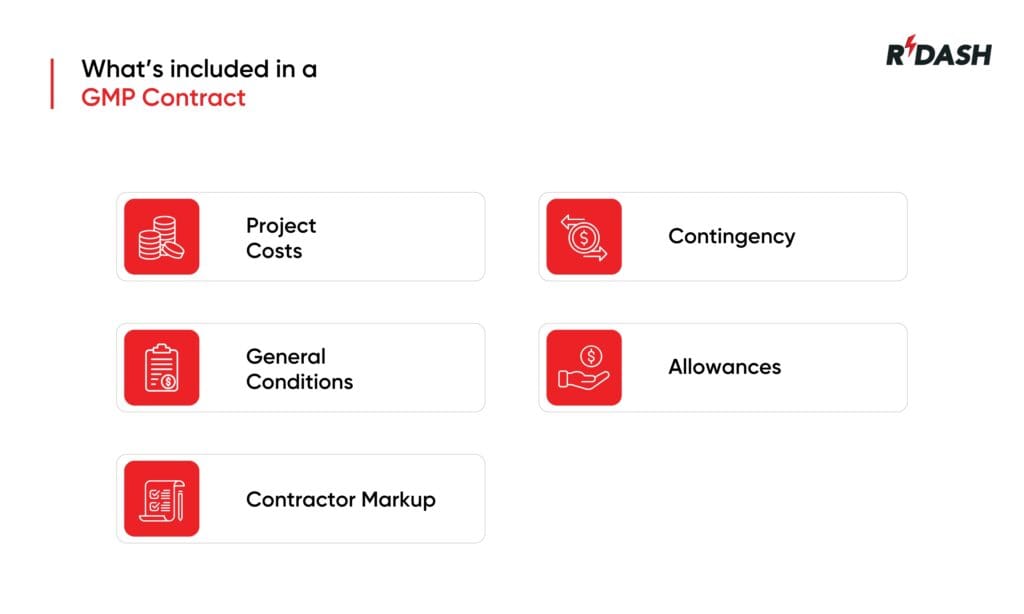
1. Project Costs
These are the direct costs related to the actual construction work, including labor, materials, equipment, and services necessary for the project’s completion. Project costs are meticulously detailed in the contract to ensure every aspect of the project is accounted for and transparent.
2. General Conditions
This section of the guaranteed maximum price contract includes costs that are not directly tied to physical construction but are necessary for managing the project. General conditions might cover site management, staff costs, site facilities, legal fees, and office administration. These are often fixed costs that provide for the day-to-day operation of the construction site.
3. Contractor Markup
This is an agreed-upon percentage over the cost of labor and materials which compensates the contractor for profit and overhead. The markup is calculated based on the total project costs and is designed to ensure the contractor achieves a reasonable profit provided the project is managed efficiently under the terms set by the guaranteed maximum price.
4. Contingency
Contingency funds are set aside within the guaranteed maximum price to address unforeseen expenses that are not covered by the initial project cost estimates. This financial cushion is crucial for managing risks that could lead to cost overruns, such as unexpected site conditions or price inflation in materials.
5. Allowances
Allowances in a guaranteed maximum price contract specify budgets for particular items or tasks whose details are not yet finalized at the time the contract is signed. For example, an allowance might be set for fixtures and fittings that are to be selected later. This gives the client some flexibility to choose specifics later on without significantly altering the overall budget.
Example of a guaranteed maximum price (GMP) contract
Imagine a scenario where a construction firm is contracted to build a new corporate office complex in a major city. The agreement decided upon is a Guaranteed Maximum Price (GMP) contract, which includes comprehensive details to cover all aspects of the construction financially and operationally.
The total project cost is agreed at ₹10 crores, which encompasses all the labor, materials, and machinery required to complete the building. This also includes any subcontracted work, such as electrical and plumbing, necessary for the project’s completion. General conditions are allocated ₹1 crore to cover non-direct construction costs such as site management, security, temporary utilities, and the rental of construction equipment.
An additional markup for the contractor is set at 15% of the total project costs, calculated to provide a profit margin and cover overhead expenses, resulting in a contractor’s fee of ₹1.5 crores. This ensures that the contractor gains sufficient compensation for their expertise and the risks they manage while keeping the project within the agreed maximum price.
A contingency fund of ₹50 lakhs is also included within the GMP to address unforeseen expenses throughout the construction process. This fund is crucial for managing risks that could potentially lead to cost overruns, such as unexpected increases in material costs or issues arising from unexpected site conditions.
Furthermore, allowances amounting to ₹75 lakhs are specified for elements of the construction that require flexibility in choice or finalization, such as architectural features, landscaping, and interior decorations. This allocation allows the client to make specific selections later in the project timeline without impacting the overall budget agreed upon in the GMP contract.
By setting these financial and structural components in the contract, both the contractor and the client are clear on the financial commitments and the operational boundaries. This clarity helps in maintaining a transparent, accountable, and efficient management of the construction project, ensuring both parties are safeguarded and the project is delivered within the specified budget, enhancing trust and satisfaction in the contractual relationship. There are various other types of construction contracts available; if you’re interested in exploring alternatives, you can check them out here.

